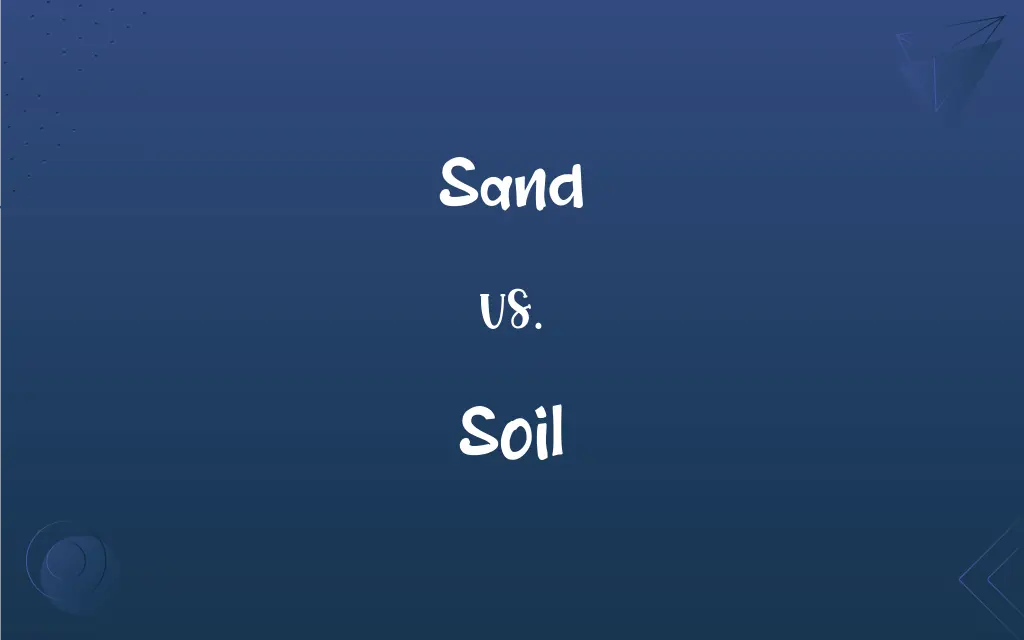Sand vs. Soil: What's the Difference?
Edited by Aimie Carlson || By Janet White || Updated on October 9, 2023
Sand is a loose granular material resulting from the erosion of rocks, while Soil is the upper layer of earth in which plants grow, a mixture of organic remains, minerals, and rock particles.

Key Differences
Sand is primarily composed of tiny mineral or rock particles, often seen on beaches, deserts, and certain land areas. Conversely, Soil covers vast stretches of land and acts as the primary medium for plant growth, encompassing various organic and inorganic materials.
Sand's granularity means it has large spaces between particles, which makes it well-draining but poor in retaining nutrients. In contrast, Soil's composition varies; it can retain water and nutrients essential for plant life, depending on its type and components.
The origin of Sand is mainly from the weathering and erosion of rocks, and its uniform composition reflects that. On the other hand, Soil is formed from the breakdown of rocks combined with decomposed organic matter, giving it a richer and more diverse structure.
Sand is often used in construction, as a component in concrete, and in various recreational activities. Whereas Soil, due to its fertile nature, is essential for agriculture, gardening, and supports a multitude of ecosystems.
While Sand is just one component, Soil comprises various elements, including sand, silt, clay, and organic matter, offering a more complex and nurturing environment for diverse life forms.
ADVERTISEMENT
Comparison Chart
Composition
Tiny mineral/rock particles
Mixture of organic remains, minerals, rock particles, and more
Retention
Drains quickly, poor nutrient retention
Can retain water/nutrients, varies by type
Origin
Erosion of rocks
Breakdown of rocks + decomposed organic matter
Primary Use
Construction, recreation
Plant growth, agriculture
Complexity
Uniform material
Comprises various elements, richer structure
ADVERTISEMENT
Sand and Soil Definitions
Sand
A loose granular material of worn-down rock particles.
Hildren love building castles with the Sand at the beach.
Soil
A mixture of minerals, organic matter, and small rock particles.
Adding compost enriches the Soil with organic matter.
Sand
A natural substance often found in deserts and beaches.
He vast expanse of Sand in the desert can be overwhelming.
Soil
The medium that supports terrestrial plant life.
With the right Soil, her garden flourished.
Sand
A component used in construction and concrete.
E'll need more Sand to mix with the cement.
Soil
A substance that varies in composition across different regions.
The Soil in mountainous regions differs from that in plains.
Sand
Small loose grains of worn or disintegrated rock.
Soil
A material often studied for agricultural or construction purposes.
We conducted a Soil test before starting construction.
Sand
(Geology) A sedimentary material, finer than a granule and coarser than silt, with grains between 0.06 and 2.0 millimeters in diameter.
Soil
The top layer of the earth's surface in which plants can grow, consisting of rock and mineral particles mixed with decayed organic matter and having the capability of retaining water.
Sand
Often sands A tract of land covered with sand, as a beach or desert.
Soil
A particular kind of earth or ground
Sandy soil.
Sand
The loose, granular, gritty particles in an hourglass.
Soil
Country; land
Native soil.
Sand
Sands Moments of allotted time or duration
"The sands are numb'red that makes up my life" (Shakespeare).
Soil
The agricultural life
A man of the soil.
Sand
(Slang) Courage; stamina; perseverance
"She had more sand in her than any girl I ever see.
In my opinion she was just full of sand" (Mark Twain).
Soil
A place or condition favorable to growth; a breeding ground.
Sand
A light grayish brown to yellowish gray.
Soil
The state of being soiled.
Sand
To sprinkle or cover with or as if with sand.
Soil
A stain.
Sand
To polish or scrape with sand or sandpaper.
Soil
Filth, sewage, or refuse.
Sand
To mix with sand.
Soil
Manure, especially human excrement, used as fertilizer.
Sand
To fill up (a harbor) with sand.
Soil
To make dirty, particularly on the surface.
Sand
(uncountable) Rock that is ground more finely than gravel, but is not as fine as silt (more formally, see grain sizes chart), forming beaches and deserts and also used in construction.
Soil
To disgrace; tarnish
A reputation soiled by scandal.
Sand
A beach or other expanse of sand.
The Canadian tar sands are a promising source of oil.
Soil
To corrupt; defile.
Sand
Personal courage.
Soil
To dirty with excrement.
Sand
A particle from 62.5 microns to 2 mm in diameter, following the Wentworth scale.
Soil
To become dirty, stained, or tarnished.
Sand
A light beige colour, like that of typical sand.
Soil
To feed (livestock) with soilage.
Sand
A single grain of sand.
Soil
(uncountable) A mixture of mineral particles and organic material, used to support plant growth.
Sand
A moment or interval of time; the term or extent of one's life (referring to the sand in an hourglass).
Soil
(uncountable) The unconsolidated mineral or organic material on the immediate surface of the earth that serves as a natural medium for the growth of land plants.
Sand
(colloquial) A sandpiper.
Soil
(uncountable) The unconsolidated mineral or organic matter on the surface of the earth that has been subjected to and shows effects of genetic and environmental factors of: climate (including water and temperature effects), and macro- and microorganisms, conditioned by relief, acting on parent material over a period of time. A product-soil differs from the material from which it is derived in many physical, chemical, biological, and morphological properties and characteristics.
Sand
Of a light beige colour, like that of typical sand.
Soil
Country or territory.
Sand
(transitive) To abrade the surface of (something) with sand or sandpaper in order to smooth or clean it.
Soil
That which soils or pollutes; a stain.
Sand
(transitive) To cover with sand.
Soil
A marshy or miry place to which a hunted boar resorts for refuge; hence, a wet place, stream, or tract of water, sought for by other game, as deer.
Sand
To blot ink using sand.
Soil
Dung; compost; manure.
Sand
Fine particles of stone, esp. of siliceous stone, but not reduced to dust; comminuted stone in the form of loose grains, which are not coherent when wet.
That finer matter, called sand, is no other than very small pebbles.
Soil
Faeces or urine etc. when found on clothes.
Sand
A single particle of such stone.
Soil
A bag containing soiled items.
Sand
The sand in the hourglass; hence, a moment or interval of time; the term or extent of one's life.
The sands are numbered that make up my life.
Soil
A wet or marshy place in which a boar or other such game seeks refuge when hunted.
Sand
Tracts of land consisting of sand, like the deserts of Arabia and Africa; also, extensive tracts of sand exposed by the ebb of the tide.
Soil
(transitive) To make dirty.
Sand
Courage; pluck; grit.
Soil
(intransitive) To become dirty or soiled.
Sand
To sprinkle or cover with sand.
Soil
To stain or mar, as with infamy or disgrace; to tarnish; to sully.
Sand
To drive upon the sand.
Soil
(reflexive) To dirty one's clothing by accidentally defecating while clothed.
Sand
To bury (oysters) beneath drifting sand or mud.
Soil
To make invalid, to ruin.
Sand
To mix with sand for purposes of fraud; as, to sand sugar.
Soil
To enrich with soil or muck; to manure.
Sand
A loose material consisting of grains of rock or coral
Soil
To feed, as cattle or horses, in the barn or an enclosure, with fresh grass or green food cut for them, instead of sending them out to pasture; hence (due to such food having the effect of purging them) to purge by feeding on green food.
Sand
French writer known for works concerning women's rights and independence (1804-1876)
Soil
To feed, as cattle or horses, in the barn or an inclosure, with fresh grass or green food cut for them, instead of sending them out to pasture; hence (such food having the effect of purging them), to purge by feeding on green food; as, to soil a horse.
Sand
Fortitude and determination;
He didn't have the guts to try it
Soil
To enrich with soil or muck; to manure.
Men . . . soil their ground, not that they love the dirt, but that they expect a crop.
Sand
Rub with sandpaper;
Sandpaper the wooden surface
Soil
To make dirty or unclean on the surface; to foul; to dirty; to defile; as, to soil a garment with dust.
Our wonted ornaments now soiled and stained.
Sand
Small, fine particles of stone.
He Sand between her toes felt warm and comforting.
Soil
To stain or mar, as with infamy or disgrace; to tarnish; to sully.
Sand
Material often used in filtration processes.
He water filter uses Sand to trap impurities.
Soil
To become soiled; as, light colors soil sooner than dark ones.
Soil
The upper stratum of the earth; the mold, or that compound substance which furnishes nutriment to plants, or which is particularly adapted to support and nourish them.
Soil
Land; country.
Must I thus leave thee, Paradise? thus leaveThee, native soil?
Soil
Dung; fæces; compost; manure; as, night soil.
Improve land by dung and other sort of soils.
Soil
A marshy or miry place to which a hunted boar resorts for refuge; hence, a wet place, stream, or tract of water, sought for by other game, as deer.
As deer, being stuck, fly through many soils,Yet still the shaft sticks fast.
O, sir, have you taken soil here? It is well a man may reach you after three hours' running.
Soil
That which soils or pollutes; a soiled place; spot; stain.
A lady's honor . . . will not bear a soil.
Soil
The state of being covered with unclean things
Soil
The part of the earth's surface consisting of humus and disintegrated rock
Soil
Material in the top layer of the surface of the earth in which plants can grow (especially with reference to its quality or use);
The land had never been plowed
Good agricultural soil
Soil
The geographical area under the jurisdiction of a sovereign state;
American troops were stationed on Japanese soil
Soil
Make soiled, filthy, or dirty;
Don't soil your clothes when you play outside!
Soil
The topmost layer of the earth where plants grow.
The Soil in this region is fertile and suitable for farming.
FAQs
What is the primary role of Soil in nature?
Soil acts as the main medium for plant growth and supports various ecosystems.
Does Soil always retain water efficiently?
Not always; Soil's water retention varies depending on its composition.
How is Sand mainly formed?
Sand is formed primarily from the erosion and weathering of rocks.
Is Sand beneficial for plant growth?
On its own, Sand isn't ideal for plant growth due to poor nutrient retention, but it can improve drainage in soil mixes.
Can Sand retain water well?
No, Sand drains quickly and has poor water retention due to its large particle gaps.
What primarily makes up Sand?
Sand is primarily composed of tiny mineral or rock particles.
What roles do worms and microbes play in Soil?
They break down organic matter, aerate the soil, and contribute to nutrient cycling, enhancing soil health.
Why is Soil essential for agriculture?
Soil provides the necessary nutrients and medium for crops and plants to grow.
Are there different types of Sand?
Yes, Sand types vary based on their mineral composition and the rocks from which they originate.
Why is Soil conservation important?
Conserving soil prevents erosion, maintains its fertility, and ensures sustainable agricultural practices and ecosystem health.
Can Soil types vary within small geographic areas?
Yes, soil types can vary significantly even within short distances, influenced by factors like topography, parent material, and organic activity.
What components can be found in Soil?
Soil includes sand, silt, clay, minerals, and decomposed organic matter.
Can you grow plants in Sand alone?
While some plants can tolerate sandy conditions, most require a richer soil mix for optimal growth.
What determines the fertility of Soil?
Soil fertility is determined by its mineral content, organic matter, pH level, water retention capacity, and microbial activity.
In what industries is Sand a crucial resource?
Sand is vital in construction, glass-making, foundry, and even certain technological industries.
Is desert sand suitable for construction?
Desert sand grains are often too round and fine for construction, making them less ideal than other sand types.
How does Soil influence ecosystems?
Soil provides habitat, sustenance, and supports diverse micro and macro organisms, influencing ecosystem health and function.
Is Sand always dry?
No, Sand can be wet or moist, especially near water bodies, but it dries out faster than most soil types.
Can Sand be man-made?
While natural sand is common, there's also manufactured sand made from crushed rock for construction purposes.
How does human activity impact Soil health?
Unsustainable farming, deforestation, pollution, and urbanization can degrade soil health, reducing its productivity and ecological function.
About Author
Written by
Janet WhiteJanet White has been an esteemed writer and blogger for Difference Wiki. Holding a Master's degree in Science and Medical Journalism from the prestigious Boston University, she has consistently demonstrated her expertise and passion for her field. When she's not immersed in her work, Janet relishes her time exercising, delving into a good book, and cherishing moments with friends and family.
Edited by
Aimie CarlsonAimie Carlson, holding a master's degree in English literature, is a fervent English language enthusiast. She lends her writing talents to Difference Wiki, a prominent website that specializes in comparisons, offering readers insightful analyses that both captivate and inform.































































